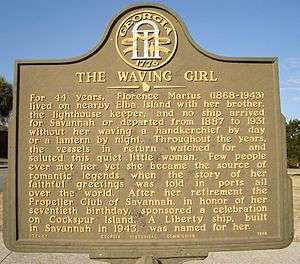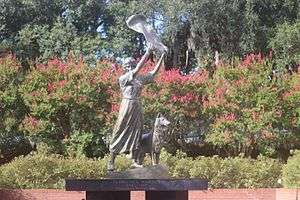Florence Martus
Florence Martus (1868–1943), also known as "the Waving Girl", took it upon herself to be the unofficial greeter of all ships that entered and left the Port of Savannah, Georgia, between 1887 and 1931. A few years after she began waving at passing sailors, she moved in with her brother, a light keeper, at his small white cottage about five miles up the river from Fort Pulaski. From her rustic home on Elba Island, a tiny piece of land in the Savannah River near the Atlantic Ocean, Martus would wave a handkerchief by day and a lantern by night. According to legend, not a ship was missed in her forty-four years on watch. A statue of Martus by the sculptor Felix de Weldon has been erected in Morrell Park on the historic riverfront of Savannah.


Personal life
Martus' father was an ordnance sergeant at Fort Pulaski on Cockspur Island, where she was born.[1]
Legends
Many other legends endure about this woman, notably the following:
- The reason she greeted ships was because she had fallen in love as a young girl with a sailor and wanted to be sure he would find her when he returned.[2] When, after 44 years, he did not, she died of a broken heart
- Sailors would bring her gifts[2]
- When the captain of the ship that brought her memorial statue to Savannah arrived, he refused to accept payment because of his fond memories of Martus[3]
While these old tales may be accurate, there is no strong supporting evidence for any of them.
Legacy
On September 27, 1943 Liberty ship SS Florence Martus was named in her honor.
In 1999, the city of Savannah named its ferry service the Savannah Belles Ferry after five of Savannah's notable women, including Florence Martus.[90]
The Waving Girl historical marker was officially dedicated in 1958 and is located near the visitor center at Fort Pulaski. [4]
Notes
- NPS National Park Service
- Legendary Lighthouses: Great Lighthouses-South Atlantic at www.pbs.org
- Charleston and Savannah at www.softadventure.net
- "The Waving Girl". Galileo.USG.edu. University System of Georgia. Retrieved 10 July 2019.
External links
- Savannah Online article
- The Waving Girl historical marker